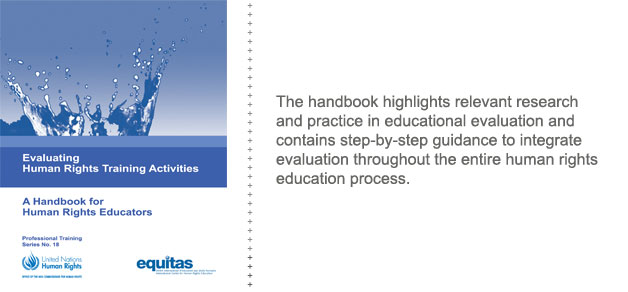May 10, 2011: Publication of “Evaluating Human Rights Training Activities: A Handbook for Human Rights Educators” We are pleased to inform you that EQUITAS- International Centre for Human Rights Education and the Office of the United Nations High Commissioner for Human Rights (OHCHR) have jointly published “Evaluating Human Rights Training Activities: A Handbook for Human Rights Educators”. The Handbook aims at strengthening the evaluation of human rights education/training (HRE) activities with a view to increasing their impact. It highlights relevant research and practice in educational evaluation and contains step-by-step guidance, including examples of tools and techniques, to integrate evaluation throughout the entire HRE process including design, delivery and follow-up. The Handbook is organized as follows:

Part 1 – Evaluating HRE: exploring the basics It reviews the goals, content and process of HRE. Key concepts of educational evaluation are then introduced, as well as two models of educational evaluation that can guide human rights educators in incorporating evaluation into their HRE work. Part 2 – Evaluating HRE: a step-by-step process It outlines a five-step process for evaluating human rights training sessions for adult learners. This process, which includes training needs assessment, defining results, formative evaluation, end-of-training summative evaluation and impact and transfer evaluations, directly links the design of evaluation with the different phases of a training design cycle. Data analysis methods and techniques as well as different means of communicating results are also addressed. Part 3 – Particular evaluation concerns It looks at a number of important issues and questions that human rights educators will need to deal with when evaluating HRE activities and also provides some useful strategies for addressing them. Issues include the role of gender in evaluation, the effects of culture and language, evaluation of evaluations, and finding time and resources for evaluation. Part 4 – Tools and techniques for evaluation in HRE It presents a broad collection of practical tools and techniques, which can be easily adapted to suit particular needs, for the different types of evaluation – from training needs assessment to evaluating transfer and impact. Part 5 – Useful resources for HRE evaluation It contains a variety of resources consulted in the development of this Handbook, including print and electronic materials, and a list of relevant websites. The handbook can be downloaded here. It will be available in Spanish in September 2011 and in French in December 2011.